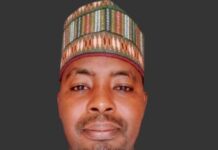What is new or novel in this effort at combating insurgencies and other criminalities unknown to Nigerian State actors that are not put to test? We know that these insurgents’ coalitions like Boko Haram (BK) and the Islamic States in West Africa (ISWAP) do not answer to any government; they operate across our national borders and may have access to advanced technology. All their victims were caught up in a new kind of confrontation that looms as a new governance system was about to begin. It was a clash between Democracy and Anarchy; between the ‘’Rule of Law and the No Rule at All’’, to quote Madeleine K. Albright, former US Secretary of State (1997-2001).
These words proved accurate when the loosely-knit transnational cleric’s movements quite literally devoted itself to the promotion of anarchy. We saw that with Marwa Maitatsine (1927-1980), Cameroonian cleric whose curse-laden public speeches against Nigerian were well known. With the coming of a democratic system of government in 1999 to date, insurgent groups like the Maitatsine’s successor, the BH and ISWAP, the NDM, IPOB, MASSOB etc all over the country managed to kill, destroyed economic infrastructures for some selfish interests. Some are into armed robbery to finance for weapons as well as kidnapping for ransom. They show no scruples in inflicting a large number of civilian causalities. All these as we witnessed contained some mastering of what Johann Most’s pamphlet titled “Science of Revolutionary Warfare” pointed to the use of weapons such as IED, dynamites that were targeted to crowded places like markets, places of worship and motor parks. Increased in size and scope of these murderous organizations in our midst makes them more daring as modern science through the Internet offers more terrible weapons development techniques which may someday wreak unparallel destruction.
Political violence by individuals and groups has occurred throughout Nigerian history and contrary to the danger these insurgents groups posed, previous governments’ paid scant attention, responding when it was almost too late (with the death of Maitatsine in 1980 and Muhammad Yusuf on July 30th 2009). My argument is that the government must give fighting insurgency higher priority even though another threat like the military coup which the Maitatsine group inadvertently was responsible is quite remote now. We are 22 years into a democratic system of governance.
Covert Skills.
Critics argue that the danger is very much present with us and is mounting in absolute as well as relative terms because of the changes in insurgents’ motivations, methods and organization. We recalled the 1995 nerve gas attack on a Tokyo subway by the Japanese cult Aum Shinrikyo. Before that incident, the debate over terrorist using weapons of mass destruction {WMD} was unimaginable. Brian Jenkins, terrorist Expert was quoted to have said: “who thought it would happen because it had not”. The fact is that WMD capability is gradually coming within range of many sub-state actors through the general diffusion of scientific skills. As we observe, our home has grown terrorists content to cause dozens of casualties will probably stick with the conventional method, but, more ambitious of them might be tempted by chemical, biological or even nuclear alternatives. While profiling these alternatives, Falkenrath et al has this to say:
Chemical weapons suitable for mass casualty attacks can be acquired by virtually any state and by non-state actors with moderate technical skills. Certain very deadly chemical warfare agents can quite literally be manufactured in a kitchen or basement in quantities sufficient for mass casualty attacks………..
Many states and moderately sophisticated non-state actors could construct improvised but effective biological weapons……Culturing the required microorganisms, or growing and purifying toxins, is inexpensive and could be accomplished by individuals with college-level training in biology and basic knowledge of laboratory technique. Acquiring the seed stocks for pathogenic microorganisms is also not particularly difficult……
Nuclear weapons are within the reach of tens of states, with the most significant constraint being the ability to produce plutonium or highly enriched uranium. If this obstacle were avoided through the theft or purchase of fissile material, almost any state with reasonable technical and industrial infrastructure could fabricate a crude nuclear weapon…. (as could) some exceptionally capable non-state actors.
How should the government view this conundrum?
Discussion of the future threat of using WMD by the terrorist groups should begin with the recognition that previous predictions of rampant catastrophic terrorism have proved wrong until the Tokyo subway attack of 1995. This serves to indicate the possibility of a biological attack on the populace by a terrorist organization. Religious and ideological terrorist groups, such as Boko Haram and ISWAP have come to the fore. This is where it starts to get worrisome. While the government is now saying that the number of terrorist attacks has declined, but what about the number of casualties per each attack carried out, beginning lately with Zabarmari in Borno State? Between the beginnings of January 2020 to November ending 2020, there were 142 incidents involving BK/ISWAP. At least 1,606 deaths were recorded on the average of 13 deaths per event. Zabarmari alone recorded 76 deaths. Record of casualty in January 11th 2021 suggested 13 deaths. It could be higher. (Source: africanews.)
What truly comes to mind, as far as the Northern States is concerned, is the religious fanaticism that considers violence sacramental act or believes they are the direct instruments of divine retribution. There are also disturbed or hate-filled activists all over the country who want to inflict pain on a large scale. Given these trends and the fact that terrorists tend to copy each other’s methods, I am left with no choice but to consider all possible scenarios. Weapons of mass destruction are not the car bombs we witnessed in the previous attacks, but a situation nevertheless calls for precautionary measures to reduce vulnerability and manage potential consequences.
Policy Adjustments
I believe Nigerian government is adhering to Heymann’s prescription where he made a persuasive case for avoiding overreaction to terrorist attacks, arguing both that it would be tragic, for democracies to abandon their cherished freedoms and principles in a quest for absolute security and, that there is little reason to believe that a heavy-handed approach to counter-terrorism would work.
But, we must consider that Nigeria is made up of many nations, despite the abuse so often heaped on it, the argument that federal government power creates responsibility continues to express the essential truth. It is a truth that cannot be finessed or wished away. States who engaged the renegades no doubt are expected to play a different role. Their responsibility for order would certainly be modest. As we are witnessing, no peace settlements provoked more controversy or regret than those with the bandits in Zamfara and Katsina states. Were the failure of peace and the resumption of banditry due to flawed treaty or to wider uncontrollable forces? Did the governments in Katsina and Gusau felt the bandits were pursuing unnecessary vindictive settlements? My belief is that Governor Masari and his homologue in Zamfara must have felt that their treaties with bandits offer favourable terms as a relatively flexible instrument that would ultimately end the worst social upheavals. Indeed, these state political leaders who came across as well-intentioned, rational leaders could not bridge the differences and therefore make the commitments necessary for lasting peace. So what are the realities?
Some observers expect that the new service chiefs would build great disciplining forces that not only create but shall guarantee order. This is where we relate to power and order. We want to avoid a situation where power exists but cannot ensure order. That is not to say that the need for the order will be met, only that if it is met it will be largely through the instruments of the Commander in Chief.
In almost all discussion on insurgence/terrorism, nothing was said about the constitutional role of the National Assembly. Daily newspapers are awash with the constitutional powers of extending the tenure of office of service chiefs, IGP, other paramilitary heads. Have we endowed the National Assembly with power to make laws as an expression of natural rights and duties, emergent customary practices or remain tied to the consent of other arms of government like the Executive?
Recommendations.
Some of the recommendations for the re-structuring Nigerian polity seem ambitious. They have provided some insights into the shaky nature of the country but failed to underscore the limitation of theoretical and policy constructs in vogue today. They are more in the tentative term while overlooking the beauty of the constitution, suggesting a way forward. It should be noted ever since the privatization policy unfolded, politics became a simple process of asset stripping, and less endowed North was left to stagnate. This must serve as a warning call to all Nigerians.
My take, however, is to make serious effort to challenge conventional wisdom about the failure of security through improved intelligence collection and analysis. Groups that cause the greatest concern; religious fanatics, cults and freelance extremists are precisely those that have not been receiving standard intelligence attention. They tend to be ignored since most of them may have no prior criminal history. Thanks for the CORONA; we have now improved the epidemiological surveillance system in tracking incidences of a killer virus that could be released or airborne.
We have started restructuring the security infrastructures but more can be achieved by restructuring bureaucratic organizations. As forensic Unit exists within the police, our Universities can be on hand to set up units with a speciality in biological as well as chemical weaponry analysis. With enhanced domestic surveillance and establishment of rapid response units, catastrophes of biological or chemical attack can be mitigated immediately.
The government must deal with developmental challenges head-on. This includes education, health care delivery, job creation, youth empowerment and healthy political atmosphere amongst others.
Outlaw selling of dynamites and other substances that can be used as a weapon. Companies like fertilizer processing plant as well as pharmaceutical firms, construction and other major industrial plants should be educated about strict self-policing and reporting measures so that any missing item can be traced before turning them into weaponry.
Educate the public about the dangers of biological/chemical weapons just as we are being educated on COVID-19. I believe with strong political leadership and a coherent national strategy will help to prepare the nation against covert WMD use by any insurgent group or terrorist organization.
Conclusion.
Quoting Gideon Rose in “It Could Happen Here”, he says, in the end, the answer should be neither complacency nor hysteria but rather modest, sustained investment in countermeasures and preparedness. Individuals take out insurance policies all the time to hedge against disasters that will probably never occur. This is one case where the government should do the same and count ourselves lucky if the premiums are ultimately wasted, amen.
MK Ilyasu can be reached via kabirilyasu@yahoo.com.
Follow the Neptune Prime channel on WhatsApp:
Do you have breaking news, interview request, opinion, suggestion, or want your event covered? Email us at neptuneprime2233@gmail.com





